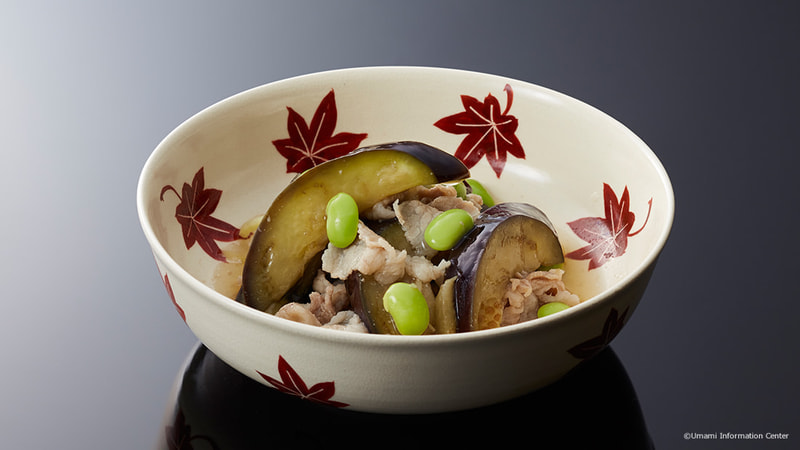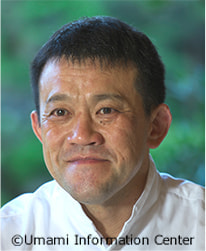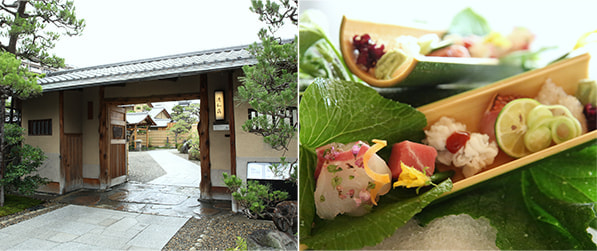QUICK PORK RIBS AND AUTUMN EGGPLANT STEW
- Umami in Washoku
- Autumn
August 2020

- Stir-fried eggplant in season with sliced pork ribs then parboiled in umami-rich ichiban dashi.It is in perfect accord with the first rice of the year.
■ Ingredients( for 4 persons )
- 300g thin sliced pork rib
- 1 (100g) eggplant
- 1 1/2 (20g) ginger
- 400g edamame
- Mixed seasoning
400cc ichiban dashi
50cc dark soy sauce
50cc mirin
10cc sake
1 tbsp sugar - 1 tbsp vegetable oil
- To boil edamame
1.5 L water
1 tbsp salt for sprinkling on edamame and rubbing in (a)
2 tbsp for boiling (b)
■ Recipes
- 1. Sprinkle salt (a) on the edamame and rub in. Leave salt as it is. Add more salt (b) in 1.5L of water and let it boil. Put in the edamame and boil for 3~5 minutes.
Strain it with a strainer and leave to cool. - 2. Mix the seasonings well in a bowl.
- 3. Wash the eggplant and remove calyces. Cut the eggplant lengthwise then slice into 1cm thick strips.
- 4. Wash the ginger and shave its skin. Slice it as thinly as possible and cut it into fine strips.
- 5. Separate thin-sliced pork ribs and cut them into 2cm widths.
- 6. Put vegetable oil into a pan or a deep skillet. Heat it up to medium heat and put in the ginger and eggplant.
- 7. Mix them well with vegetable oil and add seasoning, then add the pork.
- 8. Loosen a lump of meat before the seasoning’s temperature becomes too high.
- 9. When the ingredients come to a boil and froth gathers on the surface, skim it off.
Continue to boil for about five minutes and let it cool down. - 10. Serve on a plate and garnish with shelled edamame.
<Profile>

Tetsuo TAKENAKA
Third generation owner of Traditional Kyoto Cuisine Seiwaso
Born in 1963 in Fushimi, Kyoto, Japan. Graduated from Doshisha University, he was trained at the traditional Japanese restaurant “Tsuruya” for three years. Then he took over his family’s restaurant “Seiwaso”. He also plays a lively part as a member of Japanese Culinary Academy (Nonprofit organization), disseminating information about washoku in the US, Spain, France, Italy, Vietnam and so on. In addition, he is dedicated to shokuiku, food education for members of society, including children centering on the umami taste.
<Store information>

Traditional Kyoto Cuisine Seiwaso
The name Fushimi derives from a word meaning “abundant water,” and the area is blessed with sake breweries. Seiwaso started the business in Fushimi, and it celebrates its 61st anniversary this year. Their Kyoto cuisines are full of seasonal ingredients and umami-rich dashi. Customers can enjoy their delicious dishes in a traditional sukiya style of building. The chef sources traditional Kyoto vegetables from neighboring farms and obtains the finest seafood and other fresh ingredients both locally and from all over Japan.
Restaurant Website
